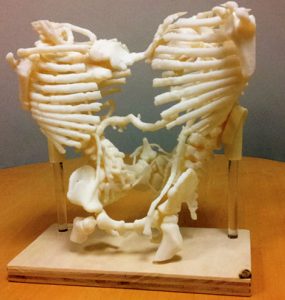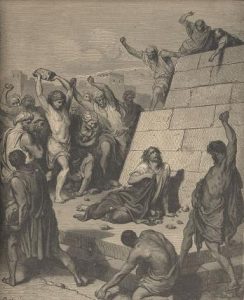On CBC radio’s The Current this morning, Anna Maria Tremonti interviewed a doctor who was responsible for the multiple surgeries that separated conjoined twins at MassGeneral Hospital for Children in Boston.  The story was mostly concerned with the ethical implications of the surgery, as well as some details about the family involved. The parents had twin girls who were born joined at the pelvis and abdomen and had elected for surgery to avert the nearly inevitable circumstance in which one of the girls—the weaker one who was subject to illness—died while still attached. The subsequent load of toxins would soon overwhelm the other sister and kill her.
The story was mostly concerned with the ethical implications of the surgery, as well as some details about the family involved. The parents had twin girls who were born joined at the pelvis and abdomen and had elected for surgery to avert the nearly inevitable circumstance in which one of the girls—the weaker one who was subject to illness—died while still attached. The subsequent load of toxins would soon overwhelm the other sister and kill her.
Although the surgery might prove to be fatal to both girls, and quite likely would kill the weaker one, the family—in consultation with a medical team, ethicists at the hospital, and their clergy—decided to go ahead with the procedure. They accepted the risks of the procedure since they might lose both girls if they remained conjoined. The surgery proved to be fatal to the weaker twin, since she could not live without the other. Scans before surgery showed that her weak heart was heavily dependent on a massive artery that went from her healthier twin to her heart. Once that artery was cut, she succumbed with ten minutes.
The background of the story was interesting enough, and I was as drawn to the medical information surrounding the procedure as anyone, but one relatively minor aspect of the story drew my attention in particular. The family came from a rural village where their superstitious neighbours were considerably worked up about the birth of the twins. The girls were not seen as unfortunate victims a genetic accident, but rather as a harbinger of evil. In their Christian village the  family was shunned, and the girls—on the rare occasions that the parents took the babies outside—had rocks thrown at them. The family feared for their lives, the safety of their children, and both their social and professional lives were considerably disrupted by their neighbours’ reaction.
family was shunned, and the girls—on the rare occasions that the parents took the babies outside—had rocks thrown at them. The family feared for their lives, the safety of their children, and both their social and professional lives were considerably disrupted by their neighbours’ reaction.
I understand this part of the story well enough. In a world of ignorance, their likely uneducated and superstitious neighbours readily found a mythological explanation for the occurrence. Although they might have taken another route to their differential treatment, like the conjoined children born in India who are viewed as lucky, their profound intellectual privation no doubt fueled their extreme prejudice. Their reaction might be seen to be understandable on this level, for if they believe in the ineffable then the magic of the twin’s birth might well affect them, much as a cat puking up a hairball can predict a surge in the international stock market. Once reasoning is thrown aside, then anything becomes possible.
The part that becomes harder to understand is their neighbours’ subsequent application of mythology to the family’s attempt to ameliorate the girls’ situation. The family sought a medical alternative to the daughters’ care, and that also proved to be a problem for their superstitious fellow villagers. Their “reasoning,” if I may use the word so loosely, was that god had created the children in that form and it was up for the parents to accept god’s superior judgement. The villagers’ reasons for throwing rocks at the children becomes difficult to understand once they have made that claim, however. Were they intentionally stoning god’s work, and either forgetting that aspect of their own reasoning or enacting parts of the bible that encourage rock throwing as a punishment for a host of crimes, working on Sunday, adultery, and wearing mixed fabric.
If we accept the premise—that god created the children, or allowed them to be born conjoined—then it follows that their birth state would have his explicit consent. Presumably he would have some grand reason to cause such misery. Perhaps god was testing the family’s resolve,  and they are merely a modern version of Job who was tormented so god could prove to satan that Job’s love was real.
and they are merely a modern version of Job who was tormented so god could prove to satan that Job’s love was real.
The part that becomes difficult to comprehend is how their reasoning follows from that initial flawed and unsubstantiated premise. Even if they presume that god did such a thing to the unfortunate children, it does not follow that the neighbours would be able to predict god’s reasoning. Perhaps their god knew the family was too sedentary, and this was the only way he could imagine getting them to move away from their home village of superstitious fools. If his project was forcing change upon a resistant family then he might well have tinkered cruelly with the girls and thus lead them on a path toward what he wanted.
The villagers not only presume god is behind the children’s medical condition, but that they know better what god might intend than the god to whom they ascribe the action. If god is responsible for the accident of birth, then why are they throwing rocks? Do the villagers believe that their god had the children born so that they would have someone to lob rocks at? If god is responsible for the children’s situation, why do the villagers despise a family who has furnished such palpable proof of god’s existence and malicious involvement in the lives of his most helpless subjects?
Once they have thrown their rocks—and they still believe the children’s circumstance is due to god’s interference and therefore should not be medically tinkered with—how do they know god’s intentions so well that they know the doctors should stay away? Do they avoid all doctors, since the same reasoning would apply to anyone? Does anyone in the village  wear spectacles without fear of a stoning, since they are circumventing god’s divine plan for their partial blindness?
wear spectacles without fear of a stoning, since they are circumventing god’s divine plan for their partial blindness?
The story declined to report on the family’s home country, let alone village, in order to protect the remaining relatives in the village. If the neighbours get wind of the children’s surgery, and that god’s divine plan of irate and violent villagers has somehow been evaded, then the family fears the neighbours may attack their relatives. They have no faith that god can take care of his own vengeance, even given a bible that offers a plenitude of proof the contrary, but they feel that they need to supplement his possibly delayed judgement day with a divine village lynching.
The true gods in the village are the neighbours, for they have determined the accident of birth is divine, they have ascribed a punishment they think suitable, they have set the limits on what can be done to improve the children’s life, and they have decided to punish any who do not follow their commandments. Certainly they are the worthy inheritors of the cruel god of the Old and New Testament, for they invent reasoning on the spot, assign punishments as cruel as the initial deformity, and then demand that the girls stay in the fallen state so that they have someone to torment.
One of the reasons that modern humans have rejected such superstitious claims as those of religions is situations like these. Since the villagers have chosen to act as they will and merely use any god they can get their hands on as an excuse, there is no reasoning with them. The family had no choice but to escape, and even if they miss their homicidal and intolerant neighbours, they cannot go back for fear of their lives. They will still consult with their clergy, who are largely responsible for this type of intolerance, but in other ways the human species will continue to drag the decaying retinue of the mindless village into the future. Although their beliefs are harmless enough when they don’t deicide to inflict them on others, they are easily turned from a plowshare to a sword.
Once reasoning has been set aside, once we have decided that evidence is not important when judging the world around us, then we open ourselves to the ravening beast of such cultural artifacts. If the villagers were amendable to reason, then the family could have asked them to consider that they are attacking—according to their own beliefs—god’s children. If revulsion still overcame their emotive control and they still wanted to throw rocks, they might have been reminded that the same type of medical interventions they take advantage of might work with the children. If their eyeglasses proved to be within the line of god’s treatments when major surgery was not, then they might have been asked what the hapless family might be expected to do.
The empathy we would like to expect from our fellow humans should make up the shortfall of their reasoning, but once poisonous ideas help to shore up visceral antipathy, and reasoning has been subsumed under mythology and madness, we are left no recourse but to leave. Many people around the world no doubt applaud the family and feel for their twin’s circumstance, and mercifully those who are all too eager to cast stones are largely confined to small communities and we may hope in the future their mental weaknesses disappear entirely.
